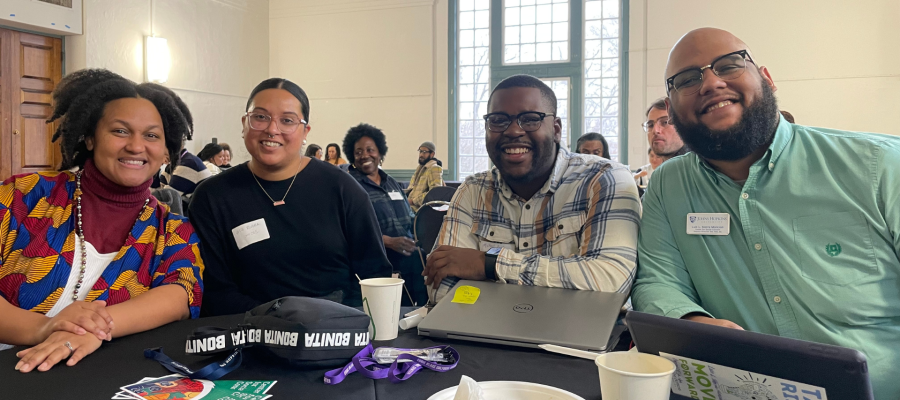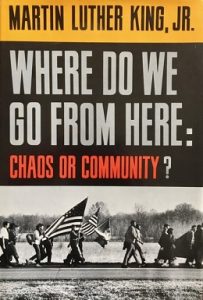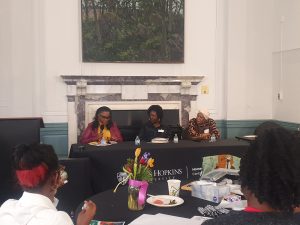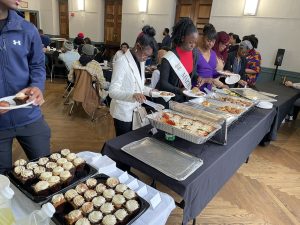Commemorating History in the Present: Martin Luther King Jr. Day Luncheon

by: Sierra Romero
“We failed to institutionalize our history,” said Dr. Joanne Martin, co-founder of the National Great Blacks in Wax Museum. After a pause, Martin continued sharing her observation of Black history and culture being lost every generation, the systemic element contributing to this erasure, and what she and her late husband decided to do about it. “We were going to create a museum right in the heart of our community – so deep, so profound – that you would understand what we meant by saying community development and cultural development go hand in hand.” The crowd rang out in applause.
On Monday, January 15th, close to 50 individuals gathered in Levering Hall to honor the social justice work of Martin Luther King Jr. Sponsored by the Center for Social Concern (CSC), Inheritance Baltimore, and the Center for Africana Studies, the luncheon reflected on the journey of some of Baltimore’s Black community and cultural workers, exhaling and connecting with each other – while centering their voices and sharing their narratives.
Where Do We Go From Here: Chaos or Community
 The luncheon, Where Do We Go from Here: Chaos or Community, was named after Dr. King’s last published book in 1967. First drafted in Jamaica, Where Do We Go from Here is a reflection of the Civil Rights Movement and an analysis of what’s needed for the next phase of the movement. King concluded that all Americans need to come together to fight poverty, create an equality of opportunity, and be mindful of ongoing race relations in the country.
The luncheon, Where Do We Go from Here: Chaos or Community, was named after Dr. King’s last published book in 1967. First drafted in Jamaica, Where Do We Go from Here is a reflection of the Civil Rights Movement and an analysis of what’s needed for the next phase of the movement. King concluded that all Americans need to come together to fight poverty, create an equality of opportunity, and be mindful of ongoing race relations in the country.
The Luncheon
The morning began with a welcome address by Dr. Jasmine Blanks Jones, Executive Director of the Center for Social Concern, and Dr. Minkah Makalani, Director of the Center for Africana Studies. Following this was a libation, a pouring of liquid as an offering to a memory of the ancestors, given by Cheryl Hinton.
There were two different discussion panels immediately afterwards. The first was led by Hopkins affiliates, Tonika Berkley, Angela Koukoui, and Dr. Shawntay Stocks. The three talked about the importance of teaching one’s values and reconnecting with oneself through education and advocacy. Another layer was introduced about how advocacy shows up in community organization and institution partnerships and the necessity to recognize the unequal power dynamics that exist in terms of finances and other resources.
The second panel was led by community members of Baltimore City, Sonia Eaddy, Dr. Joanne Martin from the National Great Blacks in Wax Museum, and Betty Bland Thomas from the Historic Sharp Leadenhall Community Association. The three shared their wisdom and experiences with the audience.
 Sonia Eaddy spoke about the story of the Poppleton neighborhood and the resident’s struggle with forced displacement. She encouraged the audience to learn how to keep what’s yours and explained how eminent domain works. Betty Bland Thomas shared her aspiration for the younger generation to take leadership in shaping the city and stressed the need for them to be prepared to do so.
Sonia Eaddy spoke about the story of the Poppleton neighborhood and the resident’s struggle with forced displacement. She encouraged the audience to learn how to keep what’s yours and explained how eminent domain works. Betty Bland Thomas shared her aspiration for the younger generation to take leadership in shaping the city and stressed the need for them to be prepared to do so.
Participants then broke for discussion sessions over lunch, feasting on crab cakes, stuffed bell peppers, and cupcakes catered by Xquisite Catering. The table discussions were a chance for new partnerships to develop among JHU affiliate, Baltimore City high school volunteers, and leaders from across the city.
Funded by Transform Mid-Atlantic
The Center for Social Concern was one of the five Transform Mid-Atlantic (TMA) campus partners that were awarded a total of over $16,000 in 2024 Dr. Martin Luther King Jr. National Day of Service Grants to support campus-community volunteer generating events that commemorate King’s work.
Transform Mid-Atlantic is a non-profit membership association of public, private, 2- and 4-year colleges and universities across Maryland, Washington, D.C., and Delaware. TMA provides leadership and assistance to its members by advocating for academic and co-curricular civic engagement program development. View all photos from the event here.
